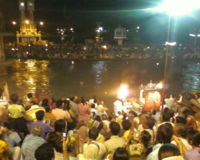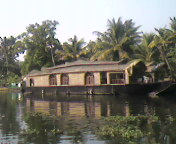User:Deepa
(![]() : Hello Deepa. Please click edit and fill in the personal information box. Don't forget to add your photo instead of the photo of wikieducator. Thank you. --Nellie Deutsch 04:49, 7 June 2009 (UTC))
Today is: 23 February, 2025
: Hello Deepa. Please click edit and fill in the personal information box. Don't forget to add your photo instead of the photo of wikieducator. Thank you. --Nellie Deutsch 04:49, 7 June 2009 (UTC))
Today is: 23 February, 2025
| [▲] | |||
|---|---|---|---|
| Occupation: | Student,Delhi University | ||
| Nationality: | Indian | ||
| Languages: | English, Hindi, Malayalam | ||
| Country: | India | ||
| |||
The plant has evolved interesting cross pollination techniques. Its main pollinator is the humming bird.
Photo taken at International FlowerExpo 2007 at New Delhi
Floral adaptation is one of the most intriguing features of plants. Heliconia , Ophrys (an orchid) and many other plants’ floral adaptations give these plants an edge over others in terms of survival in a competitive world. These plants adapt according to their environments forcing their pollinators to co-evolve. Hence a diverse pollinator-population ensures smooth propagation of the plant species even amidst pollination barriers.Smart!!
Reacreational plants.Visit Indian Botanical Gardens
Nature at its best
Contents
[hide]Profile
Learning as a team through group-projects had always be fun. I joined WikiEducator to be able to-
|
My name is Deepa Balagopal. I was born and brought up in New Delhi. My parents hail from Kerala, the beautiful state often called 'God's own country'.
I am a student of MSc Botany in Delhi University. Botany is a mystery unravelling, revealing the intricasies of nature and I attribute my ability to appreciate and enjoy nature to this subject.
International FlowerExpo 2007
Interests
I like reading and listening to light music during my leisure time. Spending time in a park, observing nature, at the end of a busy day is true bliss.I love travelling too. Most of my journeys are with my family to holy places. I love visiting my native place Kerala every now and then.
Recent academic projects
I had undertaken two interesting projects as part of my curriculum , one on tissue culture techniques and the other on relative water-content and mineral-content of plants inhabiting different ecosystems
Tissue culture project
The basis of tissue culture lies in the unique property of 'totipotency' seen in plants. Totipotency gives any plant cell the ability to act as a 'stem' cell thus regenerating the entire plant. Tissue culture techniques are being developed on a large commercial scale especially by horticulturists and learning the technique was a great experience.
I and my team had conducted experiments on mustard (Brassica campestris), a herb with multiple uses in the food industry (as a spice, condiment, mustard oil used for cooking) and is also known to have medicinal properties.
The general techniques in tissue culture are
- Preparation of a culture medium for growing the tissues and containing the right proportions of
- inorganic salts,
- an iron source,
- vitamins,
- amino acids,
- hormones and
- a carbohydrate source such as sucrose,
- sterilization of culture tools and
- incubation (introduction of the tissue to be cultured and its subsequent growth on the medium) under aseptic conditions.
Although each of the above mentioned factors are essential to give successful results, the outcome can largely be predicted on the basis of nature of the plant hormones added to the culture medium. The plant hormones that we used for the experiment were an auxin (Indole-3-acetic acid) and a cytokinin (Benzylamino purine). Generally speaking, absence of any plant hormone leads to poor results or negligible callus (unorganised mass of tissue which later forms the organs) formation; leaf and root differentiation is aided by the relative concentrations of auxins and cytokinins- a higher auxin:cytokinin ratio favours root formation and higher cytokinin:auxin ratio favours leaf formation.
Our results
Although our results were as expected, infections in the media were inevitable leaving us with a success percentage of only 46%.
This technique of tissue culture is very useful in agriculture. Desirable plants may be grown under lab conditions and planted onto fields later, thereby increasing chances of survival. I have included more information on Tissue Culture Techniques sub-page.
Water-storing and Mineral-accumulating properties of plants
For this project I and my group had chosen three plants- Hydrilla a water plant, Basil- a terrestrial plant (scientific name- Ocimum) and Kalanchoe (scientific name- Bryophyllum)- a xerophyte or one adapted to grow under dry conditions, to study their relative water-storing and mineral-storing properties. Mineral content is difficult to ascertain accurately by experimental methods because it may vary with the time of sampling (seasonal or diurnal changes) or nature of site of collection (pollution etc.)or even due to errors induced during experimentation. Water-content studies were satisfactory- Kalanchoe was found to have the maximum water content-water in its tissues- this feature helps it tide over the water-deficient times. It comes under the category of CAM plants that show special adaptive features of this kind. Hydrilla was next in terms of water content which is a characteristic feature of hydrophytes when compared to plants of other habitats. Ocimum or basil, a terrestrial plant showing characteristic mesophytic features was found to have least water content.
Our results
- For water content (in increasing order)
Bryophyllum > Hydrilla > Ocimum
- For mineral-content (in increasing order)
Bryophyllum > Ocimum > Hydrilla
A sample which is representative of the general population is difficult to obtain and so generalisation in terms of water-content and mineral-content in tissues is difficult to obtain.
My sandbox
Feedback
| EL4C27 | WiZiQ Meeting |

|
Introduction to Wikieducator Friday, June 5, 2009 15:30 to 16:00 (GMT) |
| Check your time | JOIN US |
WiZiQ is an on line live class. Register on WiZiQ.com by clicking on the link. It is Free.
(![]() : Join [1] in advance, to participate in the online live discussion. You may interact by typing as in chat or get a mic & headphones to talk and a webcam to be seen.--Gita Mathur 08:50, 2 June 2009 (UTC))
: Join [1] in advance, to participate in the online live discussion. You may interact by typing as in chat or get a mic & headphones to talk and a webcam to be seen.--Gita Mathur 08:50, 2 June 2009 (UTC))
Notes from Others
- Hello and welcome to the wiki skills workshop. Please click on edit at the top of the page, add your profile (you can always edit or add more information later), and save page (at the bottom of the page)--Gita Mathur 01:56, 19 May 2009 (UTC)
- Good evening maam. I am glad to be a part of your workshop--Deepa 15:10, 16 May 2009 (UTC)
(![]() : Great start Deepa. Keep adding. Warm wishes.--Gita Mathur 04:18, 2 June 2009 (UTC))
: Great start Deepa. Keep adding. Warm wishes.--Gita Mathur 04:18, 2 June 2009 (UTC))
 Hello Deepa, I'm Alejandra Guajardo from Peru, I'm your WikiNeighbour!! I see you've already started to work in your user page. Congratulations! If you need help with your user's page or have questions please just let me know here or through my user page. Best wishes--Alejacha 00:24, 7 June 2009 (UTC)
Hello Deepa, I'm Alejandra Guajardo from Peru, I'm your WikiNeighbour!! I see you've already started to work in your user page. Congratulations! If you need help with your user's page or have questions please just let me know here or through my user page. Best wishes--Alejacha 00:24, 7 June 2009 (UTC)
 Hello Deepa. Thank you so much for your kind words. I'm not one of the experts at WikiEducator but I'm very happy if I can help and collaborate with my wikifriends. You are doing a great job in your page. The content is really interesting and you have beautiful pictures. Congratulations!! I read your parents are from Kerala. I've heard Kerala was declared "one of the ten paradisies of the world" by National Geographic. I dream about to have the chance to cross the ocean and visit your beautiful country. Best wishes from Peru. --Alejacha 15:12, 11 June 2009 (UTC)
Hello Deepa. Thank you so much for your kind words. I'm not one of the experts at WikiEducator but I'm very happy if I can help and collaborate with my wikifriends. You are doing a great job in your page. The content is really interesting and you have beautiful pictures. Congratulations!! I read your parents are from Kerala. I've heard Kerala was declared "one of the ten paradisies of the world" by National Geographic. I dream about to have the chance to cross the ocean and visit your beautiful country. Best wishes from Peru. --Alejacha 15:12, 11 June 2009 (UTC)
(![]() : Dear Deepa, Excellent inputs. Well done. Keep your page growing. Try adding subpages for developing topics of your interest.Warm wishes--Gita Mathur 15:26, 11 June 2009 (UTC))
: Dear Deepa, Excellent inputs. Well done. Keep your page growing. Try adding subpages for developing topics of your interest.Warm wishes--Gita Mathur 15:26, 11 June 2009 (UTC))
- Hi Deepa. Your project is very interesting. India is a very beautiful country. Would like to visit Kerala one day. Have a nice weekend--Yoon 14:58, 12 June 2009 (UTC)
- Hi Deepa, Nice to see the advancements on your page. Keep adding. Feel free to ask me whenever you need help. From Participant & Facilitator now we are WikiFriends ....called as WikiNeighbours. Do give me suggestions for improving my page too...that's the Wiki Way!!! Warm wishes. --Gita Mathur 02:18, 13 June 2009 (UTC)
Welcome to Workshop EL4C27, an online workshop: June 1-12, 2009
You may wish to check the layout of the workshop and introduce yourself.
- Click on the link EL4C27.
- The page that will open is the workshop page with all the links you will be using during the workshop.
- See your name in the list of participants.
- Whenever you have time click on each of the boxes.
- You may even start with Day 1 activities.
- See the videos and slide presentations.
Enjoy the workshop.











